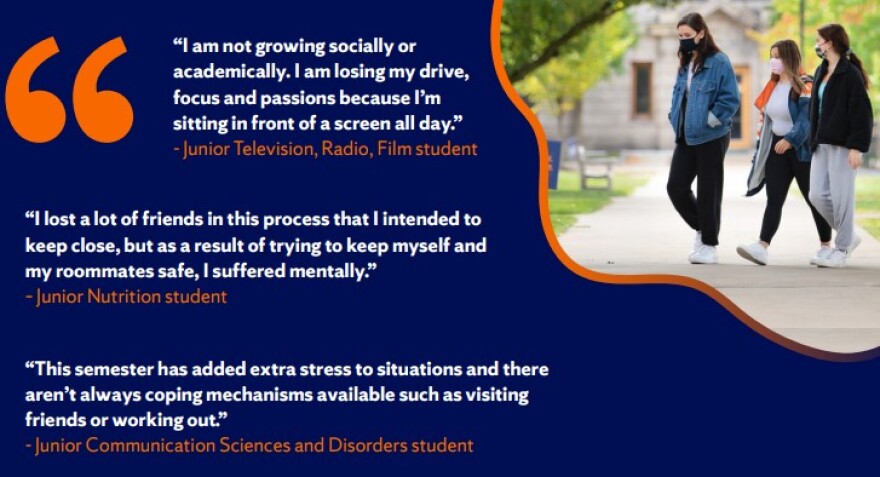New research on Syracuse University students during the pandemic shows they’re feeling extra stress, isolation, but also some silver linings. The findings could help improve education that’s had to keep people apart.
SU seniors Regan Talley, Francesca Sailer and Karley Warden helped with COVID 19 and the college exprience, that put students through surveys, interviews and focus groups. They were working with the W-2-O Center for Social Commerce, run by S-U alum Jim Weiss. They conducted 118 surveys, 6 in-depth interviews, and 3 focus groups with 24 students total.
Talley, says one thing that emerged as a concern was zoom fatigue with class after class online. Students felt mentally exhausted. And, Talley adds, they lacked enthusiasm they might normally have for courses.
“Students just feel so mentally and physically drained. And that engagement level that we’re so used to seeing, whether that’s around the table in classrooms or meeting with other peers, the engagement level is nowhere what it used to be, especially in the is environment. So we found that a lot of students felt that they actively couldn’t participate.”
More than 4 out of 5 students say they had trouble with any extra-curricular activities; Half reported they had trouble learning enough to advance their course of study. And stress extended past the classroom … Talley notes students had to navigate health and safety measures while trying to have a college experience.
“You now have to factor in, ‘are my roommates following protocol the way that I want them to, and are my friends following protocol?’ And if they’re not up to par, you really have to take into consideration, our research showed, whether or not students wanted to roll the dice and see them or roll the dice and go to their house or a separate location with them, which not everyone was comfortable doing.”
KEY FINDINGS FROM THE REPORT INCLUDE:
- 50% of students surveyed do not feel they are able to learn what they need to know to advance in their studies
- 85% of students surveyed agreed it has been challenging to feel engaged in extracurricular activities
- 65% of students surveyed did not agree that they have been able to get to know other members of their extracurricular organizations
- Only 11% of students surveyed agreed they were able to meet new people on campus
(Note: Results reflect case study findings, and are not a statistical representation)
The study recommends combatting zoom fatigue with breaks, ensuring phones are off, and including opportunities to meet peer to peer—even if that’s virtually. Karley Warden says they also found students were disheartened by changes in their careers, including losing out on internships. Although, Warden adds, using campus resources and connections can help.
“One of the recommendations was just continuing to maintain those strong connections with advisers and with the career services available because, while the university is still adapting, this university has such strong connections to the industries in every sector, and it’s really important for us to tap into those networks now, and be able to get alumni to talk to students and share those frustrations.”
They also found some silver linings in the project. Students say they developed richer friendships with their roommates and small groups as they spent more time together.
“We did hear from a lot of students, with the ability to transport themselves safely, would go to parks and outdoor spaces, especdially in the warmer months,” Warden added. “Students felt like they had that escape … and feel like they were part of that community.”
At the same time, students told the researchers they felt some responsibility not to put local residents at risk of them spreading the virus.
Talley and Warden hope the research can be used by S-U and other colleges to improve education and the experience. Advertising Professor Beth Egan, who's also co-director of the W2O Center, agrees.
“Over the past year, the global pandemic has totally up-ended the college experience and forced students, faculty and administrators to get creative, be resourceful and try new ways of teaching and learning. The research we’ve conducted builds on what we’ve all learned as we’ve navigated the pandemic together and provides helpful recommendations to support students now and in the future,” Egan said in a release.




